

Transitioning to an AIDS-Free Generation. There was much to celebrate on World AIDS Day last week.
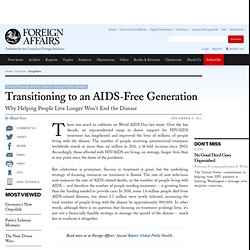
Over the last decade, an unprecedented surge in donor support for HIV/AIDS treatment has lengthened and improved the lives of millions of people living with the disease. The number of people receiving antiretroviral treatment worldwide stands at more than six million in 2011, a 16-fold increase since 2003. Accordingly, those affected with HIV/AIDS are living, on average, longer lives than at any point since the dawn of the pandemic. Will we ever have an HIV vaccine? Here’s the seventh piece from my new BBC column For around 30 years we have lived under the spectre of HIV.

In the early 1980s, the mysterious appearance of symptoms that would later be known as AIDS led to unprecedented efforts to unmask the cause. On 23 April 1984, Margaret Heckler, the US Secretary of Health and Human Services, told the world that scientists had identified the virus that was the probable cause of AIDS. Breast milk seems to kill HIV - health - 15 June 2012. Breast milk is starting to look like a potent HIV-fighter.
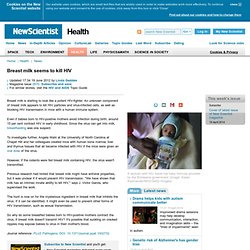
An unknown component of breast milk appears to kill HIV particles and virus-infected cells, as well as blocking HIV transmission in mice with a human immune system. Even if babies born to HIV-positive mothers avoid infection during birth, around 15 per cent contract HIV in early childhood. Facebook: The next tool in fighting STDs. Imagine being able to download a Facebook app that would alert you to your sexually transmitted infection risk based on your friend’s status updates.
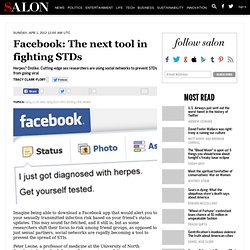
This may sound far-fetched, and it still is, but as some researchers shift their focus to risk among friend groups, as opposed to just sexual partners, social networks are rapidly becoming a tool to prevent the spread of STIs. Peter Leone, a professor of medicine at the University of North Carolina’s Center for Infectious Diseases, is one of those experts. Timeline: A Few Landmarks In the Effort to Treat AIDS. Colonialism in Africa helped launch the HIV epidemic a century ago. As to the why, here is where the story gets even more fascinating, and terrible.
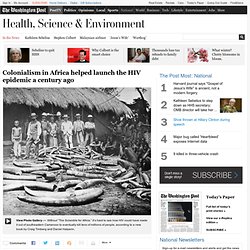
We typically think of diseases in terms of how they threaten us personally. But they have their own stories. Diseases are born. They grow. News Desk: The Changing AIDS Epidemic—and What to Do Next. There is a lot of optimism now in the community of public-health officials and advocates who work on AIDS.
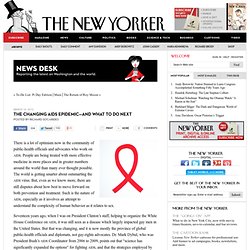
People are being treated with more effective medicine in more places and in greater numbers around the world than many ever thought possible. The world is getting smarter about outsmarting the AIDS virus. But, even as we know more, there are still disputes about how best to move forward on both prevention and treatment. India's Polio Win. In January, India marked an incredible achievement: one year since the country's last reported case of polio.
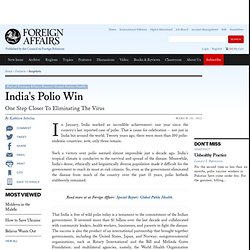
That is cause for celebration -- not just in India but around the world. Twenty years ago, there were more than 100 polio-endemic countries; now, only three remain. Such a victory over polio seemed almost impossible just a decade ago. India's tropical climate is conducive to the survival and spread of the disease. Meanwhile, India's dense, ethnically and linguistically diverse population made it difficult for the government to reach its most at-risk citizens. Read more at at Foreign Affairs' Special Report: Global Public Health. Revealed: How Cold War Scientists Joined Forces to Conquer Polio.
To many Americans, the cold war is ancient history.
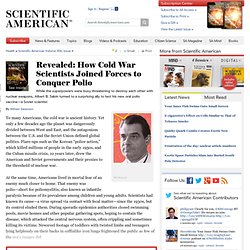
Yet only a few decades ago the planet was dangerously divided between West and East, and the antagonism between the U.S. and the Soviet Union defined global politics. Flare-ups such as the Korean “police action,” which killed millions of people in the early 1950s, and the Cuban missile crisis, 10 years later, drew the American and Soviet governments and their proxies to the threshold of nuclear war. At the same time, Americans lived in mortal fear of an enemy much closer to home. Milestones in the Effort to Eradicate Polio [Timeline] Polio's Last Act. Losing Polio - By Laurie Garrett. Last week, a Pakistani doctor was sentenced by his government to three decades in prison for actions that helped the United States kill Osama bin Laden.

Meanwhile, in far-off Geneva, the World Health Organization (WHO) declared a state of emergency in its decades-long battle to eradicate polio. That these two events are intimately connected speaks volumes about new challenges -- political ones -- that threaten to undermine extraordinary global health achievements. A tribal court in Peshawar sentenced Dr. Shakil Afridi to 33 years' imprisonment for treason -- a penalty considered mild given that the nontribal Pakistani government courts would have ordered death by hanging for the same alleged crime. Vaccine development: Man vs MRSA. Robert Daum has shown that MRSA is not confined to hospitals — and is determined to find a vaccine that will fight the bacterium.
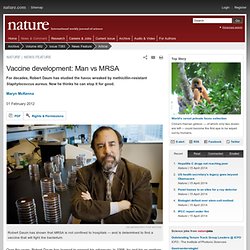
Over the years, Robert Daum has learned to respect his adversary. In 1995, he and his co-workers at the University of Chicago children's hospital in Illinois were investigating infections that had affected two dozen children in their emergency department. Three children had fast-moving pneumonia. Superfast drugs target shape-shifting enzymes - health - 13 March 2012.
It all happens in a femtosecond – a quadrillionth of a second. That's the time an enzyme needs to shape-shift into its most reactive form, trigger a chemical reaction and snap back into its original shape. We can now enter this high-speed world to interrupt the chemical reactions that sustain some of our deadliest pathogens and cause disease. Doing so could lead to antibiotics that won't trigger bacterial resistance. Should Science Pull the Trigger on Antiviral Drugs—That Can Blast the Common Cold? Hidden Epidemic: Tapeworms Living Inside People's Brains. Theodore Nash sees only a few dozen patients a year in his clinic at the National Institutes of Health in Bethesda, Maryland. That’s pretty small as medical practices go, but what his patients lack in number they make up for in the intensity of their symptoms. Some fall into comas. Some are paralyzed down one side of their body.
Others can’t walk a straight line. As Diseases Make Comeback, Why Aren't All Kids Vaccinated? Progress is easy to take for granted. When I was a child in the '60s, polio was history, measles was on the way out, and diphtheria and whooping cough were maladies out of old movies. Now these contagious diseases are making a comeback. Take measles, for instance. Malaria may kill far more people than we thought - health - 03 February 2012. Malaria kills almost twice as many people worldwide as the World Health Organization estimates, according to a major study that is causing a stir this week. Drug-Resistant Malaria Spreads, Scientists Hunt Down Genetic Causes. Lyme Disease Pushes Northwards. Lyme disease may surge this year in the northeastern United States and is already spreading into Canada from a confluence of factors including acorns, mice and the climate.The illness is transmitted from mice and deer to humans via bites from the black-legged tick, Ixodes scapularis, usually in forested areas.
According to the Centers for Disease Control and Prevention (CDC), Lyme disease is the most commonly reported vector-borne illness in the United States. Ninety-four percent of cases have been concentrated along the Eastern Seaboard and in Wisconsin and Minnesota. There were more than 20,000 confirmed cases in the United States in 2010, according to the most recent data available. But now the disease is spreading in unprecedented ways, and public health officials from the United States and Canada are investigating methods to anticipate where it will spring up next.
The climate also has effects on other organisms involved in Lyme disease transmission. 'Untreatable' gonorrhoea joins the infectious bogeymen - opinion - 08 March 2012. Antibiotic-resistant NDM-1 Is Undermining India's Medical Sector. Don't let up in war against antibiotic resistance - health - 30 April 2012.
Return of the Clap. WHO demands action on drug-resistant gonorrhoea - health - 12 June 2012. Cave Bacteria Finding Suggests Ancient Origins of Antibiotic-Resistant Superbugs. Antibiotic Fails Sinus Infection Test. Mutant protein may allow flu to kill - health - 26 March 2012. Fears over incurable TB deepen after retesting - health - 10 May 2012. Researcher death highlights dangers of pathogen work - health - 09 May 2012.